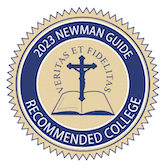Program Overview
- Provides systematic knowledge of the Catholic faith at a collegiate level.
- Develops competency and confidence in the essential teachings of the Catholic Church using Sacred Scripture, Sacred Tradition, and the documents of the Magisterium, with a special emphasis on the Catechism of the Catholic Church and the Documents of the Second Vatican Council.
- Students may choose to minor in History, Philosophy, or Sacred Scripture.
Program Goals
- Exhibit an understanding of how Catholic theology informs the Christian vocation in the world to serve the common good, defend the dignity and transcendence of the human person, and apply principles of moral living.
- Demonstrate a fundamental knowledge of the relationship between the Old and New Testaments in light of Catholic teachings.
- Exhibit a capacity to explain and utilize philosophy in the study of theology.
- Integrate knowledge of Church history and the teachings of Catholic theology, including through Church documents, to evaluate and clearly respond to contemporary challenges.
Course Preview
Program Requirements
- 120 Credits (39 Theology Major Credits, 81 General Education/Elective Credits)
- Students may choose to minor in Philosophy, History, or Sacred Scripture
Program Time Limit: 6 years
Application Process
- Submit a free program application and one letter of recommendation from church, employer, teacher, or counselor to registrar@cdu.edu.
- Submit evidence of high school completion/GED to registrar@cdu.edu.
- Students who have completed some college should also have official college transcripts submitted directly from those institutions.
Transfer Credit
Transfer Credit: Up to 60 credits (of which a maximum of 6 may be undergraduate theology credits) from an institution(s) accredited by an agency recognized by the U.S. Department of Education or whose courses are endorsed by an accrediting body recognized by the U.S. Department of Education may be transferred, provided that these credits meet the requirements of the program. In exceptional cases, applicants may request special review of additional credits by Academic Leadership. Acceptance of transfer credits is at the discretion of Academic Leadership, who determines if transfer credits align with CDU’s BA curriculum.
Those who submit official transcripts with credits earned in the past five years must have at least a 2.0 GPA from the most recent accredited issuing institution. If the overall GPA is below a 2.0, the student must successfully complete a first course at CDU with a grade of 2.0 or higher before being accepted into the program and applying for federal financial aid.
Students with official transcripts that are over five years old must successfully complete a first course at CDU with a grade of 2.0 or higher before being accepted into the program and applying for federal financial aid. CDU reserves the right to deny admission to students with more than three transcripts from different institutions.
A maximum combination of up to 30 CLEP, Advanced Placement, DANTES and/or International Baccalaureate credits may be accepted. These credits count against the maximum total number of allowable transfer credits. For more information, see the Credit by Exam Policy.
Transfer of Theology Credit: A maximum of 6 undergraduate theology credits can be transferred in. Transfer credit must have been earned no more than five years prior to transfer and grade must be at least a 2.0 and submitted via an official transcript to be evaluated for transfer. Acceptance of transfer credit is at the discretion of Academic Leadership, who determines if transfer credits align with the BA curriculum.
Program Costs
- Tuition: $1,035 x 13 courses = $13,455
- Technology fee: $165/course x 13 courses = $2,145
- Books: $100/course (estimate) x 13 courses = $1,300
- Total: $16,900, *This total does not include the 27 required General Education courses that may be fulfilled with transfer credit
- Detailed cost of attendance budgets can be found here.
*We value your privacy. By submitting this form, you agree to receive emails, texts, and calls from Catholic Distance University (CDU). You may withdraw your consent at any time.
Course Lists
CDU generously accepts transfer credits from other institutions accredited by an agency recognized by the U.S. Department of Education. Most students meet the general education requirements through a combination of transfer credit and by taking courses at CDU.
The general education requirements enhance the study of theology while fulfilling a broad, liberal arts education and stimulate a desire for lifelong learning, wonder, and the courage to live an authentic Christian life in and through specific vocational paths and in our common vocation as human persons.
The requirements reflect an ongoing commitment to academic excellence, the unity of all truth, and the integration of faith and reason. Grounded in the Western intellectual tradition and Ex corde ecclesiae, the curriculum introduces students to the fundamental knowledge, authors, and diverse learning experiences needed to become well-educated Catholics and beacons of light and truth in a rich, diverse global society.
General education courses ensure that students cultivate the skills, knowledge, and habits of mind that are essential in every field of study. To learn more, view the General Education Outcomes.
| English Language Arts | 9 credit hours |
| Humanities/Social Sciences (i.e., history, sociology, economics, political science, art, music, scripture, theology) additional scripture or theology courses not used for the major can be taken through CDU |
24 credit hours |
| Natural Sciences (i.e., biology, chemistry, physics, geology) |
6 credit hours |
| Mathematics/Computer Science (i.e., mathematics, statistics, computer usage) |
6 credit hours |
| Classical or Modern Languages | 6 credit hours |
| Philosophy | 12 credit hours |
| Electives | 18 credit hours |
To see all of the general education courses offered, please see the General Education Course List.
For a description of each of these courses, please consult the online course catalog.
General education/elective credits must be at the 100 level or higher and one must have received a grade of 2.0 (C) or higher from an accredited institution. Experiential credit cannot be used in place of academic credit.
General education/elective credits may also be fulfilled via the College Board’s Advanced Placement (AP) program and College-Level Examination Program (CLEP) and the Defense Activity for Non-Traditional Education Support (DANTES) Subject standardized Testing (DSST).
For descriptions of both required and elective courses, please consult the online course catalog. All courses listed below are 8 weeks long.
| Course Number | Course Title | Credits |
| SCRPT 210 | Reading Scripture Theologically | 3 |
| SCRPT 230 | Introduction to Scripture and Salvation History | 3 |
| THEO 204 | Foundations of Catholicism | 3 |
| THEO 213 | God, Man, and the Universe | 3 |
| THEO 232 | Jesus Christ: God, Man, and Savior | 3 |
| THEO 253 | Sacraments: Masterworks of God | 3 |
| THEO 268 | Principles of Moral Theology | 3 |
| THEO 343 | Vatican II: The Church and Her Liturgy | 3 |
*Students who have already studied Catechism I and II at the AA Level are exempt from taking THEO 204. These students are required to take three additional elective credits.
Theology Electives – 15 credits
Students can fulfill the additional 15 credits of theology electives by choosing additional CDU courses. Click here to see a full list of undergraduate courses.
Students must complete a total of six undergraduate courses (18 credits) in Philosophy at CDU, or two additional courses over and above the existing four-course distribution requirement for the BA.
| Course Number | Course Title | Credits |
| PHIL 205 | Introduction to Philosophy with Plato and Aristotle | 3 |
| PHIL 235 | Elements of the Philosophy of the Human Person | 3 |
| PHIL 250/THEO 270 | Introduction to Catholic Health Care Ethics | 3 |
| PHIL 260/THEO 280 | Catholic Bioethics I | 3 |
| PHIL 311 | Ethics | 3 |
| PHIL 315 | Metaphysics | 3 |
| PHIL 320 | Modern Philosophy (new in fall 2024) | 3 |
| PHIL 330 | Contemporary Philosophy (new in fall 2024) | 3 |
| PHIL 340 | See for Yourself: An Introduction to Epistemology | 3 |
| PHIL 370 | The Nature of Nature: An Introduction to a Catholic Philosophy of Science | 3 |
| PHIL 421/THEO 419 | Thought of Thomas of Aquinas | 3 |
A maximum of 3 transfer credits may be applied toward the minor, upon review and approval by Academic Leadership. Contact Dr. Elizabeth Shaw (provost@cdu.edu) with any questions.
To earn the Minor in History, students must complete all six undergraduate courses (18 credits) in History and Church History at CDU.
| Course Number | Course Title | Credits |
| CHIST 214 | Church History I: Early Christians to Middle Ages | 3 |
| CHIST 223 | Church History II: Renaissance to Modern Church | 3 |
| CHIST 244 | History of the Catholic Church in America | 3 |
| HIST 201 | Ancient Civilization | 3 |
| HIST 211 | Christian Civilization | 3 |
| HIST 221 | A Global Civilization | 3 |
A maximum of 3 transfer credits may be applied toward the minor, upon review and approval by Academic Leadership. Contact Dr. Elizabeth Shaw (provost@cdu.edu) with any questions.
To earn the Minor in Sacred Scripture, students must complete six of the following undergraduate courses (18 credits) at CDU.
| Course Number | Course Title | Credits |
| SCRPT 210 | Reading Scripture Theologically | 3 |
| SCRPT 230 | Introduction to Scripture and Salvation History | 3 |
| SCRPT 370 | The Letter to the Romans | 3 |
| SCRPT 381 | The Gospel of St. John | 3 |
| GREEK 101 | Biblical Greek I | 3 |
| GREEK 201 | Biblical Greek II | 3 |
| GREEK 301 | Advanced Biblical Greek | 3 |
A maximum of 3 transfer credits may be applied toward the minor, upon review and approval by Academic Leadership. Contact Dr. Elizabeth Shaw (provost@cdu.edu) with any questions.
Year 1
Fall I
ENG 105. Introduction to Composition for Theology
HIST 201. Ancient Civilization
Fall II
THEO 101. Catechism of the Catholic Church, Part 1
CHIST 214. Church History I
Spring I
SCRPT 103. Survey of the Old Testament
MATH 105. General Mathematics for Liberal Studies
Spring II
THEO 102. Catechism of the Catholic Church, Part 2
CHIST 224. Church History II
Summer
BIO 101. General Biology
LATIN 101. Latin I
Year 2
Fall I
PHIL 205. Introduction to Philosophy with Plato and Aristotle
LATIN 201. Latin II
Fall II
PHIL 235. Elements of the Philosophy of the Human Person
HUM 260/THEO 290. Theology of Sacred Architecture
Spring I
SCRPT 106. Survey of the New Testament
HIST 211. Christian Civilization
Spring II
ENG 111. Introduction to Literature
THEO 213. God, Man, and the Universe
Summer
THEO 103. The Moral Life: Living the Virtues
THEO 232. Jesus Christ: God, Man, Savior
Year 3
Fall I
BIO 150. Nutrition
THEO 419. Thought of St. Thomas Aquinas
Fall II
COSCI 101. Introduction to Computing
THEO 343. Vatican II: The Church and Her Liturgy
Spring I
SPIR 301. Applied Catholic Spirituality
SCRPT 210. Reading Scripture Theologically
Spring II
HIST 221. Global Civilization
PHIL 311 – Ethics
Summer
CHIST 244. History of the Catholic Church in America
HUM 228. Introduction to Comparative Religions: Judaism and Islam
Year 4
Fall I
THEO 268. Principles of Moral Theology
SPAN 101. Conversational Spanish for Ministry I
Fall II
ENG 310. Literary Apologetics for Theology
SCRPT 230. Introduction to Scripture and Salvation History
Spring I
PHIL 330. Contemporary Philosophy
SPAN 201. Conversational Spanish for Ministry II
Spring II
THEO 253. Sacraments: Masterworks of God
THEO 280/PHIL 260. Catholic Bioethics I
THE CDU ADVANTAGE
In a 2022 survey of CDU graduate students, 100% reported that they had achieved their learning goals.
CDU Offers:
- Authentic Catholic teaching
- Flexibility to study where and when you choose
- The lowest undergraduate tuition of any U.S.-based online university offering Catholic theology
- A global Catholic community
- Knowledgeable and accessible faculty
- Engaging online courses with discussion forums
- Mobile app for study on the go
- Online library staffed by a theological librarian
- 24/7 technical support

“I have taken several courses now, and one of the delights that I have discovered is that the same familiar names keep appearing. This is a distinguishing mark that makes this University appealing. Even though I may never see the actual faces, I am developing a circle of classmates that I am progressing through the curriculum with, and it builds a sense of camaraderie and trust.”
—Joy Baron, BA in Theology
The BA program is nationally accredited by the Distance Education Accrediting Commission (DEAC), which is recognized as a national accrediting agency by the U.S. Department of Education and is a recognized member of the Council for Higher Education Accreditation. The university is certified as a degree-granting institution by the West Virginia Higher Education Policy Commission.




